
views
Telling Your Kids About the Divorce

Tell your children as soon as possible. Once it has become certain that you and your spouse will be separating, you need to let your kids know. Make sure you’re calm and composed when you decide to tell your children, and have them sit down with you somewhere private. If your children immediately has a lot of questions, tell them that things will be different, but that you all will address each issue as they come up.

Allow specific circumstances to dictate some decisions. If you and your spouse have decided to separate amicably, you should tell your children about the divorce together. This will convey that you and your spouse still respect one another, and that you both will still be actively involved in your children's lives. If the separation is hostile, it will likely be better to tell your children on your own, in a calm environment. If you have multiple children, especially if they are of similar ages, you should sit them down and give them the news at the same time. If you have children of significantly different ages, you may want to tell older children first. If they have specific questions, you'll be able to respond to them more directly.

Be honest and straightforward. Being honest does not mean including all of the details. While there may be some specific, significant reasons that the divorce is happening, it’s best to explain the reasons why you are getting divorced in a somewhat general way. However, you should still be honest and explain this situation in a way that will soften the blow. For example, if both parents are present during the conversation, then you can start by saying, "We love you," or say "I love you," if only one parent is present. Then, you can say something like, "We've tried everything we could, but our marriage isn't working, so we are going to live apart now. We are getting a divorce." Keep it very simple with grade-school age children or younger. Older children may demand more information, but you should still choose your responses carefully.
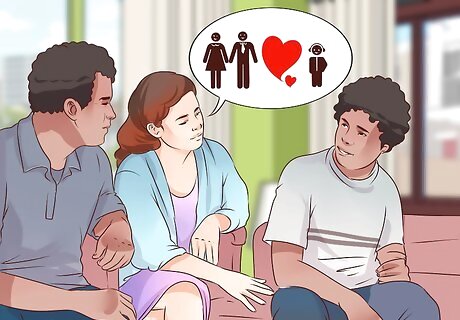
Tell your kids you love them. This basic step is of absolute importance. Children can easily become confused and frightened by a divorce. Remind them how much you care about them, and that you are still their parent. Be explicit by saying something like, “I want you to know that this doesn’t change how I feel about you at all. I still love you and I am so happy that I’m your parent." After you tell your kids that you love them, it is also important to tell your kids that they did not do anything at all to cause the divorce. Try saying something like, "This has absolutely nothing to do with you or anything you did. You did nothing at all to cause this situation. It is just a problem between your father/mother and I." Make sure that you repeat this to your kids multiple times to help them understand that they are not at fault..

Be prepared to answer their questions. Your kids may be shocked by the news, and will potentially become emotionally distraught. Very young children may not know what divorce is and will need an explanation that you will not be married and will not be living together. Allow young children to vent their sadness or anger, and focus on the fact that you love them. In addition to anger or sadness, many children will have a torrent of questions. Be prepared to answer questions you can anticipate beforehand, and be willing to admit you’re still figuring things out yourself. If you aren’t sure about how to answer certain questions, it’s perfectly alright to admit this. Say something along the lines of “I don’t know right now, but we’ll figure that out and we’ll all be okay.”
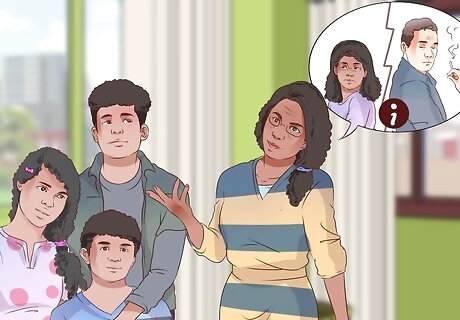
Give your children any information regarding immediate changes. Include any information you’ve agreed upon with your spouse about who will be living where and other logistical considerations such as where they’ll go to school. The idea is to provide as much information as you can about the upcoming changes in your children’s lives, as well as reaffirmation of the things that will remain the same. Among the specific things they’ll be curious about, you’ll likely want to address the following: Whether or not they will move, and where they will be living. Where each of their parents will be living. A few additional specifics, such as how they will spend summer vacations and holidays.
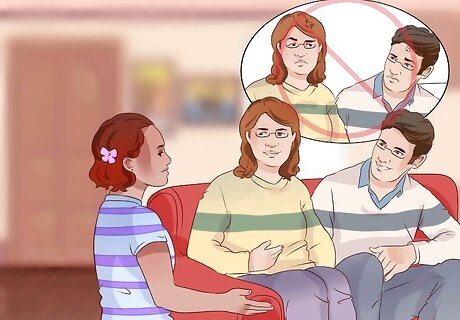
Present a united front with your children’s other parent. In particular, don’t blame your spouse for the divorce. Even if your spouse is prompting the separation, it can be hurtful to your children to be critical of your spouse. If possible, talk to your spouse about what you’ll tell your children, and come to agreement about what you’ll say. More generally, do not speak poorly of your spouse to your children. This will not contribute positively to any of your lives. Keep in mind that your children will likely still have a relationship with their other parent, and it is in their interest if that relationship is healthy.
Raising Your Kids in Separate Households
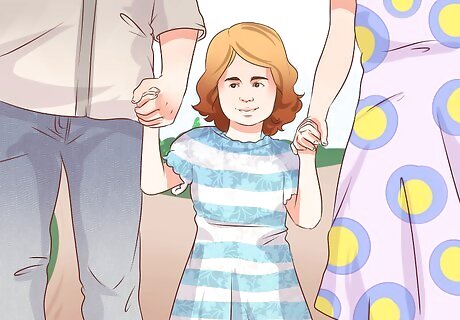
Maintain stability and structure in your children’s daily routine. If you will be cooperatively raising your children along with their other parent while separated, it’s important to get on the same page about the children’s day to day lives. Children find structure to be comforting, and uncertainty about basic aspects of their everyday lives will add to the stress and frustration they may be going through. Organize and keep a regular schedule regarding who brings the kids to school or picks them up. These aspects of a child’s life matter more than you think.
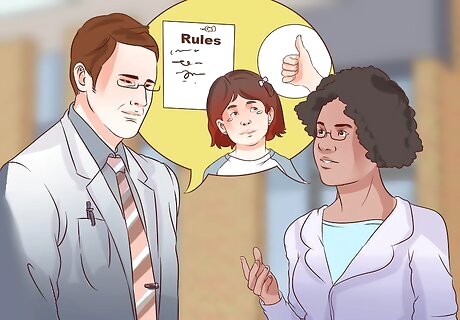
Agree upon some basic guidelines about rules. You and your spouse should come to some agreement about the rules that will be maintained in both households, as well as discipline for breaking these rules. While some rules may vary, any agreement about when and how you discipline your children will benefit everyone involved. For instance, agree on a curfew for children that are old enough to go out with friends on the weekends. Agreeing and enforcing even basic criteria will present a unified disciplinary approach. Additionally, talk about the things your children are allowed to possess. If possible, prevent scenarios in which certain things - such as violent video games, for instance - are allowed in one household and not the other. Imbalanced disciplinary approaches will become divisive and detrimental for everyone.

Avoid fighting in front of your children. Either in person or on the phone, avoid allowing your children to witness emotional disagreements between you and their other parent. These disagreements will likely occur, but you should both take care not to risk further traumatizing your children by continuing to fight in front of them. When you have something to speak about with your children's other parent, set up a time to meet when your children are not present or simply call them on the phone. If they are unavailable when you call, ask them to agree to a time to talk, and specify what it is you're hoping to speak about.
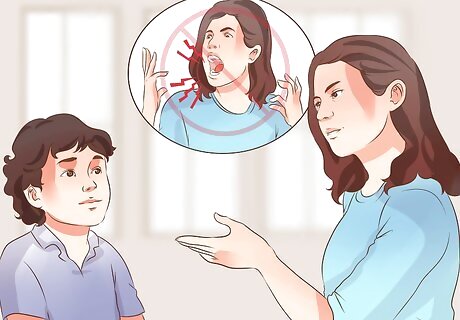
Be tactful, polite, and positive. This may admittedly prove to be challenging. Remind yourself that it in the best interest of your children to treat their other parent with respect. In particular, do not say anything disparaging about their other parent. Focus on the positives of their other parent, and remember that your children will have a strong attachment to them. Set a good example for your children about how to act with maturity and kindness. Do not, under any circumstances, make an effort to undermine your children’s relationship with their other parent. This can be hurtful to both your child and your relationship with them.
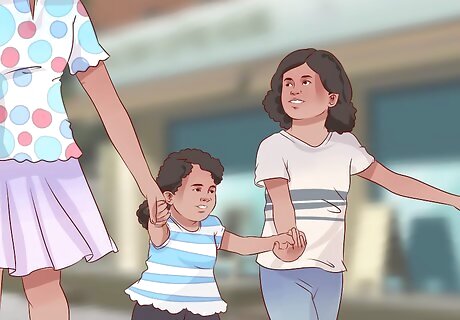
Encourage your kids to get along with one another. Children of any age will likely develop a stronger bond with one another while going through a divorce together. Never be envious of the strength of a relationship your child has with another member of their family, and encourage these relationships if at all possible. If your know one of your children has been having a rough time, ask them if they’ve talked to their siblings about it. This applies to kids of similar ages, who may understand how each other are feelings, or of different ages, who may be able to offer advice or comfort to one another.

Introduce new partners slowly and thoughtfully. You should wait a while before introducing your children to new romantic partners following a divorce. This is especially important if infidelity had been one of the reasons for your divorce. Your children's comfort and access to you should take immediate precedence to any romantic relationships following your divorce. Don't expect your children to immediately be fond of a romantic partner - particularly if you had been having an affair during your marriage. Whatever the circumstances, know that your children will likely come to respect any new relationship you develop, though it will take time.
Helping Children Express Themselves

Make sure they know the divorce was not their fault. This is a point that may need to be reiterated to your children, as it is vital that they understand they are not the reason you and your spouse are separating. Help them express themselves by encouraging them to talk about how they’re feeling with you. Understand that you may need to specifically remind them that the divorce is not their fault, by saying things like, “We decided to get a divorce so we won’t fight as often, but we’re still your parents and we will still both always be here for you.”
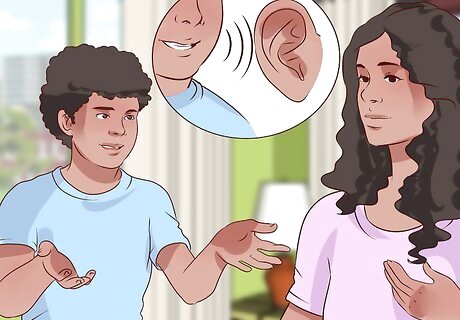
Listen carefully to what your kids are saying. Your children will experience several different strong emotions in response to the news of your separation. However, they may internalize their feelings, or struggle to express them. Help them find words for how they’re feeling by asking if they’re sad or frustrated when you notice they’re mood change. Know that your children’s feelings may fluctuate. They may seem to be okay with everything one day, but become very upset the next. Let them know that whatever they’re feeling is entirely okay, and that they should feel free to be entirely honest with you.
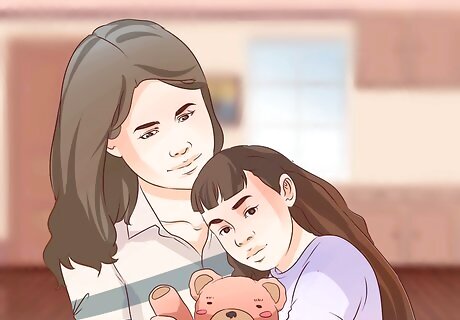
Respond with compassion and support. Show them that you trust them, and that they can trust you, by verbally acknowledging the legitimacy of the feelings they share with you. Don’t ever say they shouldn’t feel a certain way, or ignore any emotions they’re experiencing. Say things like “I understand why you feel that way, and I’m sorry that this is so hard for all of us.”
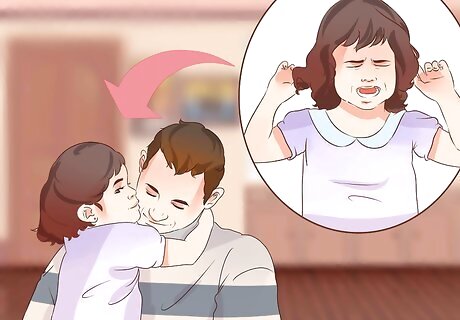
Know that your child will heal with your support. If you provide consistent love and support for your children, they will be able to deal with the reality of your divorce. Do not hesitate to express your love and reassurance; remind them often that you love them and that you will always be there for them. Most importantly, be there for them. This means spending time with your kids and allowing them the space and opportunity to speak with you about how they’re feeling when they feel comfortable doing so.

Get your child professional help. Watch out for signs that your child is having trouble handling the emotions they're feeling after your divorce. This includes children of all ages, from infancy to adulthood. Aside from counselors and therapists, some of whom specialize with working with children, there are support groups online and in-person for children going through their parents' divorce. Recognize that even your adults children may suffer from troubling emotions following your divorce, and watch out for signs that they may need additional support.
Recognizing How Age Affects Children’s Response to Divorce
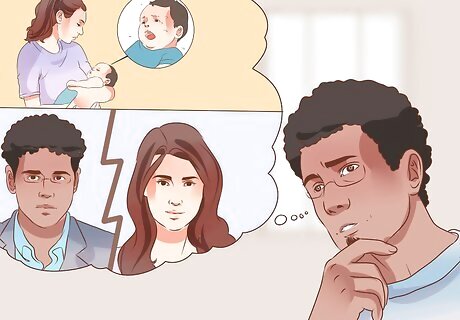
Know that even babies will be affected by divorce. Though they may not understand what is happening, babies will often feel and reflect their parent’s stress, sadness, and discomfort. If your baby shows higher irritability than normal, begins to cry more frequently, or even has trouble with sleeping or digestion, recognize that this may reflect unease related to your divorce. Try to convey a sense of calmness around your baby. In particular, avoid having emotionally fraught discussions when your baby is present.
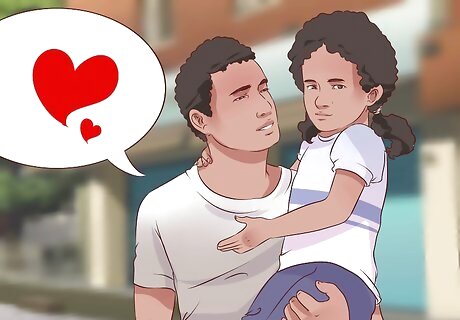
Reassure young children frequently. Preschool and kindergarten children are particularly likely to blame themselves for your separation, as they are likely to interpret their parents unhappiness as their own fault. If your child begins to act out more frequently, becomes more clingy, or is easily frightened or upset, make an active effort to reassure them more frequently by telling them that you love them and hugging and cuddling them whenever they are upset.
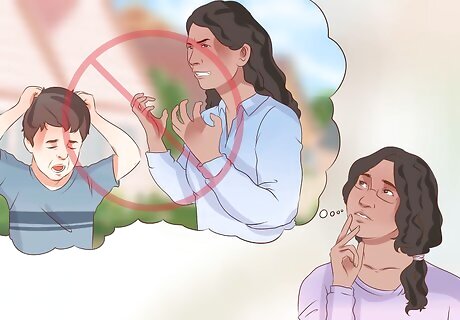
Be patient with school-aged children. Children in their pre-teen years may become especially frustrated by the emotions they’re feeling as a result of your divorce. Look for signs of fluctuating moodiness, increased aggression, discomfort with gender identities, and feelings of being deceived or rejected. Performance in school may also drop, and kids of this age may even seek punishment. Respond to these developments by being more available to your child, and responding to their emotional extremes with patience. Encourage them to share how they’re feeling and make sure they know they can speak with you whenever they want.

Know that teenagers may act out significantly following a divorce. Teenagers may go through all sorts of emotional turmoil, including diminished self-esteem. They may even attempt to develop their autonomy before they may otherwise do so, in order to try to deal with negative feelings they associate with your divorce. Watch out for signs of relationship problems with friends, substance abuse, disinterest in school, depression, and even inappropriate sexual behavior. Tell your teenage children that you remember how hard it can be to be young and deal with parents who are struggling to get along. If any of their behaviors risk getting out of control, ask your child to speak with a counselor or therapist.




















Comments
0 comment